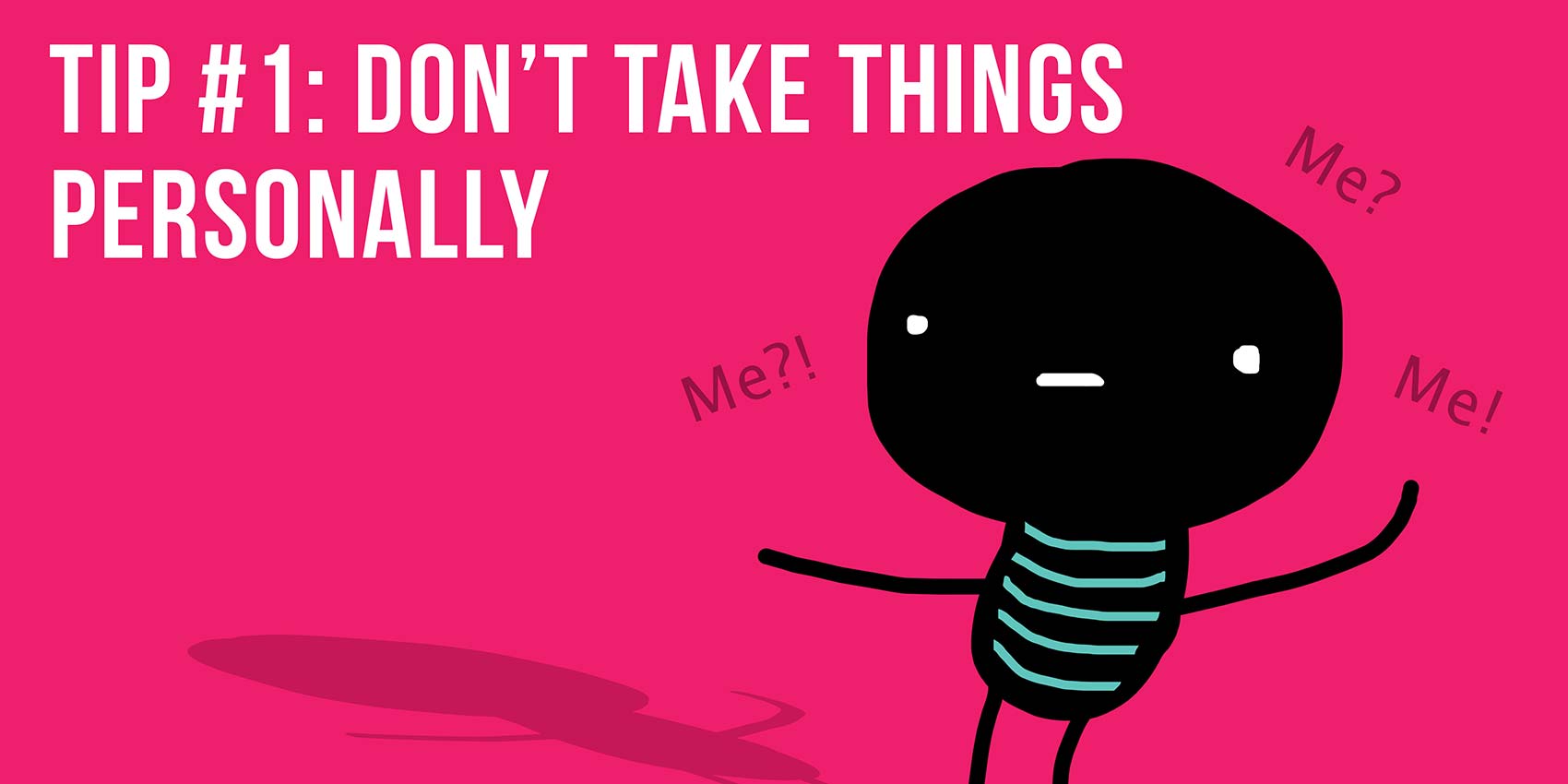18 Apr Tip 1: Do not take things personally

When you “take things personally”, you interpret what another person has said (or done) as a reflection of who you are, rather than as a reflection of the person who is speaking (or doing).
For instance, when you drift through the cafeteria line and Sloppy Joe, the bean scooper doling out the cafeteria food, growls at you every day to hold your tray up higher, he’s not growling at you because he dislikes YOU. He’s growling at you because he’s a grumpy, bitter, unhappy bean scooper who is mad at the world, not you. You kind of ‘get’ this example because it’s clear that Sloppy Joe growls at everybody! And you all talk about, and sometimes even laugh at, how darn grumpy that guy can be (he serves a mean bean.) So, naturally, you don’t take his behavior personally.
But, not taking things personally becomes more challenging when you have a connection with someone – a friend for example. But the same rule still applies: people often act a certain way not because of YOU but because that’s the way they are. So when your lacrosse coach screams, “You need to catch that ball!!!!” from the sidelines after you miss a pass – remember that he screams at everybody during games, even though you feel like he singled you out this time. His yelling isn’t about you, he yells at everyone (although the message. “Try to catch the ball next time,” is directed at you.)
Not taking things personally gets even harder when your friends or family are involved. But let’s pretend that you have a really selfish mother who only thinks about how her hair and makeup look everyday, and whether or not she has as big a wardrobe as Jenny Lunis down the block. So when you try to tell your mom that you are worried about passing your French test this week while she is putting on her mascara, she responds with a distracted, “Un-huh, I know, you’ll do fine.” Then, she stands up and asks you, “How do you like my new outfit? It’s by a French designer.” You feel pretty much blown off – like her clothes are more important than your feelings and, since she’s your mom, you think to yourself, My mom doesn’t really care about ME all that much. MY feelings aren’t that important to her. You take her reaction personally.
But truthfully, your mom doesn’t SEEM to care about ANYBODY all that much. She would have responded the same way if your brother had walked up stairs and said the same thing. Her reaction has to do with HER not YOU. The thought process that truly matches the situation would be, My mom doesn’t really care about ANYBODY all that much. Other people’s feelings aren’t that important to her. With a mom like this (which we hope you don’t have), you would really want to learn how NOT to take things personally.
Just when should you take things personally though? Certainly times occur when people are trying to tell you something about yourself that may not be easy to hear. When your friend tells you, “Hey, you don’t seem to be interested in what I am saying recently,” that is a message about your behavior. Should you take it personally? Sometimes it is not easy to tell what to take personally and what to let go… does your friend worry incessantly (meaning constantly, all the time) that people don’t pay attention to her? If so, you might not take her comment so personally. However, if your friend is pretty laid back and is always looking out for you, you may need to put more value on what she has to say about you.
As you speed through your teens years, you are developing your identity, so you are super primed (meaning ready, or prepared) to take everything people say to you as being personal to you. That is, you can be a little more prone (meaning apt, or likely) to see things as a reflection of you. Thus, this tip is telling you to slow down and think, Is this really about me, or is this the way this person behaves with everybody?
Final thought from a teenager on taking things personally:

“When I was in middle school, I thought the world was against me. I definitely took way too much stuff personally. But when I went to high school, I realized that I had wasted a lot of energy on worrying about stuff. The truth is, everyone is over-sensitive in middle school. I feel much better and less stressed now that I don’t take things personally. Instead I totally consider the source and think more about the content.”
~ Amanda, New York, NY, age 15.




corina
Posted at 05:09h, 16 AprilI don’t tend to take things personally only sometimes it depends on the person or situation I am in.
WLKHS2214
Posted at 23:00h, 26 MarchDepending on who I am talking to, I will take things personally. I would like to say that I think before I act or say out of aggression but most of the time when I am in the heat of the moment, some words might come out of my mouth that I don’t mean.
wlkhs2211
Posted at 15:20h, 08 Marchi don’t usually take things personally unless its directed towards me.
WLKHS2206
Posted at 15:17h, 08 MarchI try to not take things personally. It depends on how I see the situation and then I will decide if it was personal or not.
WLKHS2209
Posted at 15:15h, 08 MarchI do tend to take things personally. I take things personally when it is appropriate to, if you are an adult you should think and have a reasoning behind the things you say, When someone says something and includes a tone that corresponds with that I allow myself to take it personally because it will lend to knowing more about your relationships with the people around you. Even though I think it is to do with my personality, I reassure myself that the people around me may just not like me, and it can be their problem not mine, I think I can improve this and just be blissfully oblivious, but I do not think that will help me either, that will be more detrimental to my life. It is good to be aware and handle the situation accordingly, but I know I should not blame it on myself.
2220
Posted at 15:14h, 08 MarchYes, I do tend to take things personally when most of the time I know I shouldn’t. I get hung up on comments people say and can’t help it. It’s hard to really realize that not everything that is said towards you, is not particularly reflecting you as a person.